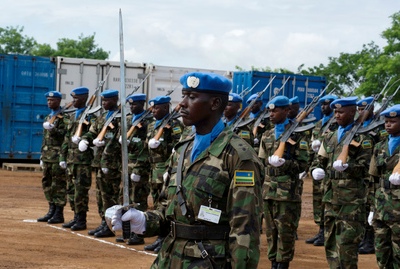UN peacekeepers blamed for not providing protection to civilians in South Sudan conflict
December 20, 2015 (ADDIS ABABA) – An international rights body has accused the peacekeepers of the United Nations Mission in South Sudan (UNMISS) of not providing adequate protection to civilians in danger in the war-ravaged nation despite its chapter seven mandate per a resolution of the United Nations Security Council (UNSC) to do just that.

A report released this week by the International Refugee Rights Initiative (IRRI) has however painted a gloomy picture on what it said was the failure by the UN peacekeepers in the world’s youngest nation to protect the civilians outside its compounds across the country.
While the report partly commended UNMISS for providing shelter and protection to nearly 200,000 civilians who managed to escape into their civilian protection sites in the country, it said the majority of vulnerable civilians were still facing danger and losing lives on daily basis without response from the peace keepers.
“As violence escalated, the United Nations peacekeeping mission in South Sudan (UNMISS) took the unprecedented decision to open its gates to thousands of civilians fleeing violence. While the opening of a number of Protection of Civilian (PoC) sites across the country did not prevent mass violence, there is no doubt that it reduced the number of people killed or injured,” partly reads the IRRI report, dated 15 December 2015, extended to Sudan Tribune.
A survivor whose life was saved because of seeking sanctuary inside one of the UNMISS protected sites said he and all of his relatives and friends would have been killed by president Kiir’s forces had it not been for the peace keepers who opened their gates to them at the peak of the conflict.
“If it was not because of peacekeepers, all of us would have been killed,” said one survivor.
However, millions of vulnerable civilians who could not make it to safety sites have continued to bear the brunt of the conflict, facing danger from the very government forces or opposition fighters who have been at war for two years.
UNMISS NOT DOING ENOUGH
Although the report commended the speed with which the decision was taken by UNMISS to open the gates in saving “some lives”, it however criticized the peace keepers for not doing enough in exercising their mandate to protect all and not some civilians in danger.
“While the UN’s actions are appreciated by the thousands seeking refuge in protected sites, there are millions more outside who are suffering. The UN peacekeeping mission has simply not done enough,” it challenged.
The report cited failure to response by UNMISS in the face of mass killings of civilians in Leer county of Unity state by government forces, targeting fleeing civilians, torching their houses and abducting and raping women. It also said such deadly incidents occurred in many other places across the country and UNMISS has not done anything.
“They [UNMISS] tell us they can only protect us if we stay here. They say that if you go out far from the camp, we can’t protect you,” a woman in Bor UNMISS protection camp was quoted as saying in the report.
While the civilians might be safer inside the camps – although on occasion the camps themselves have been attacked – the humanitarian situation is dire. People have been reduced to eating leaves and burning plastic to cook the small amount of food they have as there is nothing else left, the report further observed.
It suggested the pressing need for more action by the UN peace keepers to extend protection of civilians beyond their gates given the fragility of the implementation of the peace agreement signed in August 2015 among the warring parties in the country.
With its mandate expanding to monitor the implementation of the peace agreement, it further warned, there is a real danger that the protection of civilians will only be diluted further. This, it said, would be a disaster in a context in which the trajectory of the conflict continues to deteriorate in spite of the peace agreement.
Although the existence of the peace agreement presents hope for the vulnerable civilians in the young nation, it also cautioned that there is “little faith” in the agreement as the parties may return to war if the peace deal is not supported and left to fail with “devastating consequences for civilians.”
The report also rang an alarm bell about the internal complications of poor governance and weak state structure in South Sudan, saying the conflict’s geopolitical positioning may further complicate the situation as the two warring parties seem to further stockpile weapons.
“With both government and opposition allegedly stockpiling weapons (which are in plentiful supply); and with another internal war taking place over the border in neighbouring Sudan’s Blue Nile and Southern Kordofan states, coupled with long-established networks for destabilisation at the disposal of neighbouring governments, many of the ingredients remain in place for a protracted conflict,” it warned.
On 15 December 2013, war broke out in South Sudan when what started off as debates over reforms within the leadership of the ruling SPLM party generated into a political power struggle between president Salva Kiir and his former vice-president Riek Machar.
The violence was quickly manipulated into ethnically-aligned civil war that spread with extraordinary speed and intensity. Civilians quickly became the prime target with massacres of thousands of members of ethnic Nuer community in the capital, Juba, by president Kiir’s forces, prompting retaliations in other states.
A peace agreement signed in August has been facing stumbling blocks, but with the soon expected return to Juba of the advance team of the armed opposition group (SPLM-IO), the implementation of the first phase of the deal may successfully kick off.
(ST)
